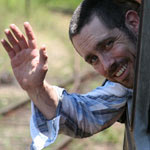Apart from a natural beauty I simply wasn't expecting, the first thing to strike me was how diverse its punters were.

Cross-dressers, families, favela kids, gay bears and pre-op, hormone-enhanced transexuals. And two pasty gringos. All sitting side by side, all shapes, sizes and colours, with no-one batting an eyelid at the kind of outfits that would cause a stampede on a British seaside. (Mind you, Brazil is a country in which the year's biggest event involves straight men dressing up as women, so hey...)

Despite this wonderful beach democracy, Brazil shouldn't be idealised. It is a country that appears to have no racial tension at all, yet there is a basic inequality that means if you're black or mixed race, then you will probably be born poor and remain that way for all of your life.
Later that day, as Ian and I hang-glided over Rio, we could see this social divide most clearly. The corrugated favela rooftops were glinting in the sun, some of these slums as populous as British cities, but nestled in hillsides behind some of South America's most exclusive beach addresses.

THING I DIDN'T KNOW BEFORE TODAY:
Brazil once had a royal family

No comments:
Post a Comment